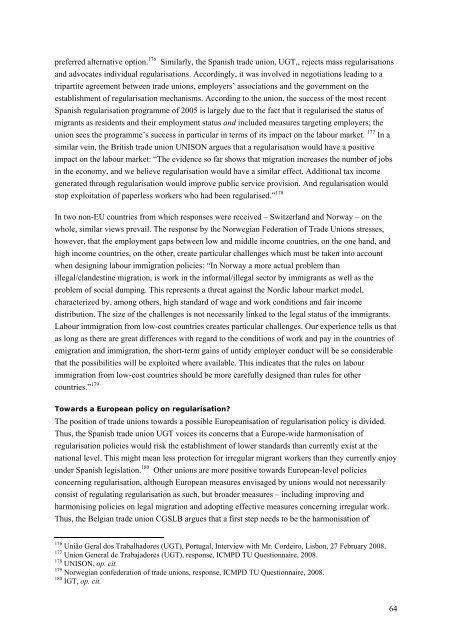REGINE Regularisations in Europe Final Report - European ...
REGINE Regularisations in Europe Final Report - European ...
REGINE Regularisations in Europe Final Report - European ...
Create successful ePaper yourself
Turn your PDF publications into a flip-book with our unique Google optimized e-Paper software.
preferred alternative option. 176 Similarly, the Spanish trade union, UGT,, rejects mass regularisations<br />
and advocates <strong>in</strong>dividual regularisations. Accord<strong>in</strong>gly, it was <strong>in</strong>volved <strong>in</strong> negotiations lead<strong>in</strong>g to a<br />
tripartite agreement between trade unions, employers’ associations and the government on the<br />
establishment of regularisation mechanisms. Accord<strong>in</strong>g to the union, the success of the most recent<br />
Spanish regularisation programme of 2005 is largely due to the fact that it regularised the status of<br />
migrants as residents and their employment status and <strong>in</strong>cluded measures target<strong>in</strong>g employers; the<br />
union sees the programme’s success <strong>in</strong> particular <strong>in</strong> terms of its impact on the labour market. 177 In a<br />
similar ve<strong>in</strong>, the British trade union UNISON argues that a regularisation would have a positive<br />
impact on the labour market: “The evidence so far shows that migration <strong>in</strong>creases the number of jobs<br />
<strong>in</strong> the economy, and we believe regularisation would have a similar effect. Additional tax <strong>in</strong>come<br />
generated through regularisation would improve public service provision. And regularisation would<br />
stop exploitation of paperless workers who had been regularised.” 178<br />
In two non-EU countries from which responses were received – Switzerland and Norway – on the<br />
whole, similar views prevail. The response by the Norwegian Federation of Trade Unions stresses,<br />
however, that the employment gaps between low and middle <strong>in</strong>come countries, on the one hand, and<br />
high <strong>in</strong>come countries, on the other, create particular challenges which must be taken <strong>in</strong>to account<br />
when design<strong>in</strong>g labour immigration policies: “In Norway a more actual problem than<br />
illegal/clandest<strong>in</strong>e migration, is work <strong>in</strong> the <strong>in</strong>formal/illegal sector by immigrants as well as the<br />
problem of social dump<strong>in</strong>g. This represents a threat aga<strong>in</strong>st the Nordic labour market model,<br />
characterized by, among others, high standard of wage and work conditions and fair <strong>in</strong>come<br />
distribution. The size of the challenges is not necessarily l<strong>in</strong>ked to the legal status of the immigrants.<br />
Labour immigration from low-cost countries creates particular challenges. Our experience tells us that<br />
as long as there are great differences with regard to the conditions of work and pay <strong>in</strong> the countries of<br />
emigration and immigration, the short-term ga<strong>in</strong>s of untidy employer conduct will be so considerable<br />
that the possibilities will be exploited where available. This <strong>in</strong>dicates that the rules on labour<br />
immigration from low-cost countries should be more carefully designed than rules for other<br />
countries.” 179<br />
Towards a <strong>Europe</strong>an policy on regularisation?<br />
The position of trade unions towards a possible <strong>Europe</strong>anisation of regularisation policy is divided.<br />
Thus, the Spanish trade union UGT voices its concerns that a <strong>Europe</strong>-wide harmonisation of<br />
regularisation policies would risk the establishment of lower standards than currently exist at the<br />
national level. This might mean less protection for irregular migrant workers than they currently enjoy<br />
under Spanish legislation. 180 Other unions are more positive towards <strong>Europe</strong>an-level policies<br />
concern<strong>in</strong>g regularisation, although <strong>Europe</strong>an measures envisaged by unions would not necessarily<br />
consist of regulat<strong>in</strong>g regularisation as such, but broader measures – <strong>in</strong>clud<strong>in</strong>g improv<strong>in</strong>g and<br />
harmonis<strong>in</strong>g policies on legal migration and adopt<strong>in</strong>g effective measures concern<strong>in</strong>g irregular work.<br />
Thus, the Belgian trade union CGSLB argues that a first step needs to be the harmonisation of<br />
176 União Geral dos Trabalhadores (UGT), Portugal, Interview with Mr. Cordeiro, Lisbon, 27 February 2008.<br />
177 Union General de Trabajadores (UGT), response, ICMPD TU Questionnaire, 2008.<br />
178 UNISON, op. cit.<br />
179 Norwegian confederation of trade unions, response, ICMPD TU Questionnaire, 2008.<br />
180 IGT, op. cit.<br />
64
















